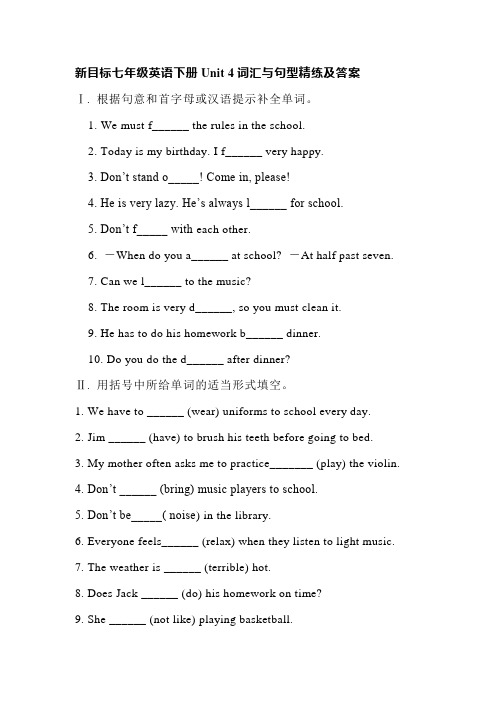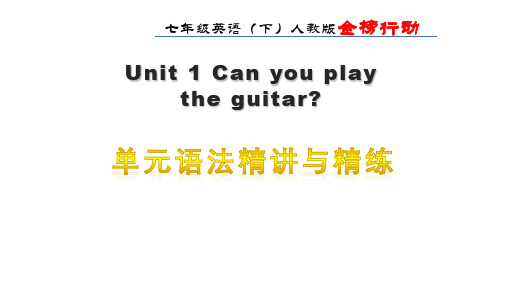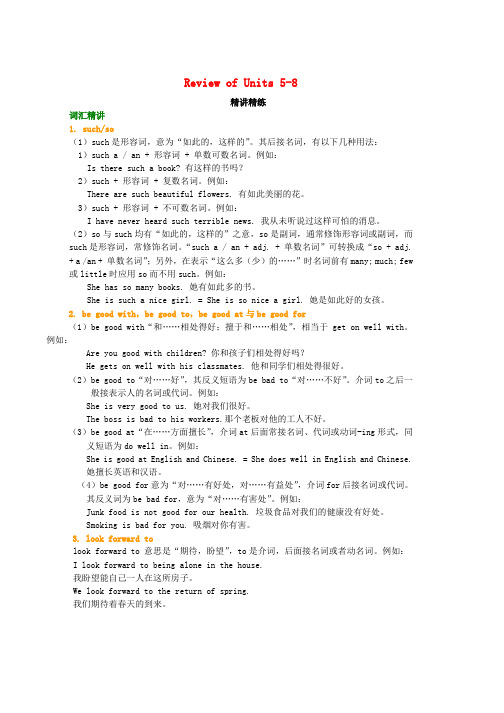七年级英语下册 Review of Units 1-4词句精讲精练 (新版)冀教版
新目标七年级英语下册Unit 4词汇与句型精练及答案

新目标七年级英语下册Unit 4词汇与句型精练及答案Ⅰ. 根据句意和首字母或汉语提示补全单词。
1. We must f______ the rules in the school.2. Today is my birthday. I f______ very happy.3. Don’t stand o_____! Come in, please!4. He is very lazy. He’s always l______ for school.5. Don’t f_____ with each other.6. -When do you a______ at school? -At half past seven.7. Can we l______ to the music?8. The room is very d______, so you must clean it.9. He has to do his homework b______ dinner.10. Do you do the d______ after dinner?Ⅱ. 用括号中所给单词的适当形式填空。
1. We have to ______ (wear) uniforms to school every day.2. Jim ______ (have) to brush his teeth before going to bed.3. My mother often asks me to practice_______ (play) the violin.4. Don’t ______ (bring) music players to school.5. Don’t be_____( noise) in the library.6. Everyone feels______ (relax) when they listen to light music.7. The weather is ______ (terrible) hot.8. Does Jack ______ (do) his homework on time?9. She ______ (not like) playing basketball.10. I have to ______ (get up) at six o’clock.III.选词填空。
1_中考一轮复习人教版七年级下册Review of Unit1-Unit4

.(过去式/过去分词) 离开
13.true (adj.)→ . truth . (n.)实情;事实 → . truly . (adv.)真正;确实
14.important (adj.)→ . importance .(n.)重要性;重要
different
difference
15.luck (n.)→ . lucky
.(过去式/过去分词) 保持;保留
19.music(n.)→ . musical .(adj.)音乐的.
→ . musician .(n.)音乐家
20.relax (v.)→ . relaxing .(adj.)令人放松的
→ . relaxed .(adj.)放松的 ;自在的
词性百变练习 形容词+名词
1. Mary usually__g_o_e_s_ (go) shopping with her mother on Sunday. 2. __D_o_e_s_ (do) Peter ___ta_k_e_ (take) a shower in the evening? 3. Lisa _d_o_es_n_’_t _d_o_ (not do) her homework in the evening. 4. I never _h_a_v_e__ (have) breakfast.
☆【典题链接】 How long will it ___ta_k__e__ (take) you to fly to Beijing from your hometown? 句意:从你的家乡乘飞机到北京将会花费多长时间?
What are the rules? We must be on time for class. What do you have to do? We have to be quiet in the library.
七年级下Units1-12单元语法精讲与精练

+1)
o’clock。
语法精讲
二、一般现在时的运用
使用一般现在时的几种情况: 1.当句中有频度副词 often(经常)、usually(通常)、sometimes (有时)或 always(总是)等,同时该句中没有表示过去或将来的时 间状语时,那么这个句子就用一般现在时。频度副词位于实义动词 之前,be动词/助动词/情态动词之后。 eg:The student often plays basketbll at school.这个学生经常在学校 打篮球。 My friends always help me with my English.我的朋友们总是在英语 上帮助我。 Sometimes Jim plays the piano after lunch.吉姆有时在午饭后弹钢琴 。
A.don’t
B.can’t
C.can
D.needn’t
( C)5.—Can I go to see a movie tonight,Dad?
—
.
A.Yes,you must B.Yes,you need
C.No,you can’t
D.No,you won’t
(A)6.The boy likes playing
七年级英语(下)人教版金榜行动
Unit 3 How do you get to school ?
语法精讲
有关交通方式的表达法
how 作为疑问副词,可以用来询问交通方式。如: How do/does sb. get to…? 乘坐不同交通工具的表达方法有以下几种: 1.take+限定词+交通工具名称(常在句中作谓语): take the bus/train/subway等。 eg:—How does your father go to Guangzhou? —He takes the train.你父亲怎样去广州?他乘火车去。
七年级英语下册ReviewofUnits5_8词句精讲精练新版冀教版word格式

Review of Units 5-8精讲精练词汇精讲1. such/so(1)such是形容词,意为“如此的,这样的”。
其后接名词,有以下几种用法:1)such a / an + 形容词 + 单数可数名词。
例如:Is there such a book? 有这样的书吗?2)such + 形容词 + 复数名词。
例如:There are such beautiful flowers. 有如此美丽的花。
3)such + 形容词 + 不可数名词。
例如:I have never heard such terrible news. 我从未听说过这样可怕的消息。
(2)so与such均有“如此的,这样的”之意,so是副词,通常修饰形容词或副词,而such是形容词,常修饰名词。
“such a / an + adj. + 单数名词”可转换成“so + adj.+ a /an + 单数名词”;另外,在表示“这么多(少)的……”时名词前有many; much; few 或little时应用so而不用such。
例如:She has so many books. 她有如此多的书。
She is such a nice girl. = She is so nice a girl. 她是如此好的女孩。
2.be good with,be good to,be good at与be good for(1)be good with“和……相处得好;擅于和……相处”,相当于get on well with。
例如:Are you good with children? 你和孩子们相处得好吗?He gets on well with his classmates. 他和同学们相处得很好。
(2)be good to“对……好”,其反义短语为be bad to“对……不好”。
介词to之后一般接表示人的名词或代词。
例如:She is very good to us. 她对我们很好。
人教版英语七年级下册ReviewofUnits词句精讲精练

⼈教版英语七年级下册ReviewofUnits词句精讲精练Review of Units 1-6词汇精讲1. work&jobwork和job作名词是同义词,都有“⼯作、职业”的意思。
不过,它们之间还是有些区别的。
(1)job是可数名词,指特定⼯作。
work是不可数名词,泛指⼯作。
我们可以说a job,不能说a work。
例如:Peter has a good job in a bank. 彼得在⼀家银⾏有份很好的⼯作。
Tom changed jobs many times. 汤姆换了很多⼯作。
Looking after three cats is not easy work. 照顾三只猫咪可不是件容易事。
(2)上班⽤英⽂讲是go to work。
这是⼀个固定搭配,我们不能说go to a job。
例如:My father goes to work at 8 a.m. 我爸爸⼋点上班。
(3)job只能⽤作名词,work还可以⽤作动词,不仅有“上班、⼯作”的意思,还可以作“努⼒”或“从事”来讲。
例如:Both of my parents work. 我⽗母都⼯作。
If you work hard, you will speak English well. 只要你努⼒,你的英语就会讲得很好。
2. either, too, also(1)too意为“也”,⼀般放在肯定句句尾。
例如:He can speak English. I can speak English, too. 他会说英语,我也会说。
(2)also意为“也”,⼀般放在句中。
⽤于be动词、情态动词、助动词之后,实义动词之前,⽐too要正式⼀些。
例如:He can speak English. I can also speak English. 他会说英语,我也会说。
He is also a student. 他也是个学⽣。
I also like music. 我也喜欢⾳乐。
七年级英语下册ReviewofUnits1_4词句精讲精练

Review of Units 1-4精讲精练词汇精讲1. sendsend是及物动词,意为“寄,发送〞,过去式和过去分词都是sent,其后能接双宾语,即send sb. sth.=send sth. to sb.。
例如:He sent me a postcard. = He sent a postcard to me. 他寄给我一张明信片。
【拓展】动词接双宾语时,有两种结构:〔1〕动词 + 间接宾语(sb.) + 直接宾语(sth.)〔2〕动词 + 直接宾语(sth.) + 介词(for/to) + 间接宾语(sb.)能接双宾语的动词可分为两类:〔1〕常用介词to的动词有:send; give; show; bring; show; teach; tell等。
例如: give sb. sth. = give sth. to sb. 给某人某物show sb. sth. = show sth. to sb. 出示某人某物〔2〕常用介词for的动词有:buy; sing; make; cook; get等。
例如: buy sb. sth. = buy sth. for sb. 为某人买某物make sb. sth. = make sth. for sb. 为某人制作某物2. amazing〔1〕amazing意为“令人吃惊的〞,指某物或某事让人惊讶。
例如:What an amazing picture! 多么出奇的一幅画!〔2〕amazing与amazed的区别:amazed作形容词,或者被动式be amazed at (by)意为“对……大为惊奇〞。
例如:be amazed to see看到……感到吃惊;be amazed to hear听到……感到吃惊amazed和amazing的主要区别是:人常表示amazed,因为人是吃惊这一行为的主体,而东西,或者人的行为等等往往是amazing,表示“令人吃惊的〞。
七年级英语下册ReviewofUnits1-4综合能力演练冀教版(2021年整理)
七年级英语下册Review of Units 1-4综合能力演练(新版)冀教版编辑整理:尊敬的读者朋友们:这里是精品文档编辑中心,本文档内容是由我和我的同事精心编辑整理后发布的,发布之前我们对文中内容进行仔细校对,但是难免会有疏漏的地方,但是任然希望(七年级英语下册Review of Units 1-4综合能力演练(新版)冀教版)的内容能够给您的工作和学习带来便利。
同时也真诚的希望收到您的建议和反馈,这将是我们进步的源泉,前进的动力。
本文可编辑可修改,如果觉得对您有帮助请收藏以便随时查阅,最后祝您生活愉快业绩进步,以下为七年级英语下册Review of Units 1-4综合能力演练(新版)冀教版的全部内容。
Review of Units 1—4综合能力演练【巩固练习】I。
单项选择。
(15分,每题1分)1.—Why does Mike sit in the front?—Because he can’t see the words on the blackboard _______ at the back.A.carelessly B.quietly C.clearly D.loudly2.-Do you want _______ chess with me this evening?—Yes,I do.I enjoy _______ chess.A.to play;playing B.playing;to play C.to play;to play D.playing;playing3.Thank you for _______ the class trip.A.organize B.to organize C.organizing D.to organizing 4.-_______ is your home from the school?—Two kilometers.A.How long B.How far C.How often D.How many 5.—How’s your school life going,Linda?-_________!A.It’s sunny B.It's on the bus C.Great D.It’s raining 6.The sweater is made _______ silk.It feels soft.A.in B.of C.from D.on7.My father _______ to Hainan every year.A.by train B.take a train C.takes a train D.by a train 8.—Why do you look sleepy?—Because I only _______ three hours last night.A.sleep B.sleeping C.sleeps D.slept9.I hope _______ to America to learn English in the future.A.to go B.for go C.go D.going10.I can’t wait _______ the piano for you.A.play B.playing C.to play D.played11.Tom is good at _______ birthday parties.A.hold B.holds C.held D.holding12.Let’s _______ dinner together.A.has B.eating C.have D.to cook13.Mr. Green _______ join our new club.A.be going to B.is going to C.will D.both B and C 14.There isn’t ________ in this movie.A.something interesting B.interesting somethingC.anything interesting D.interesting anything 15.—Would you like _______ for Beijing?—Yes,of course.A.leaving B.to leave C.leave D.leavesII。
人教版英语七年级下册Units1-4知识点总结
人教版英语七年级下册Units1-4单元知识点归纳总结Unit1Can you play the guitar?一、重点短语1.at the old people's home在敬老院2.be good at singing善于唱歌3.be good at swimming善于游泳4.be good at dancing跳舞5.be good with old people与老人相处得好6.be in our school music festival参加我们学校的音乐节e and show us来给我们展示一下e to the Students'Sports Center来学生运动中心9.do Chinese kung fu表演中国功夫10.English-speaking students说英语的学生11.help with sports在运动方面提供帮助12.in the music room在音乐室13.in the school music club在学校音乐俱乐部14.in the school show在学校汇演中15.join the swimming club加入游泳俱乐部16.like drawing/like to draw喜欢画画17.make friends with sb.和某人交朋友18.musicians wanted招聘音乐家19.need help to teach music需要帮助去教音乐20.on the weekend/on weekends(在)周末21.play chess下国际象棋22.play games with people与人玩游戏23.play the drums打鼓24.play the guitar弹吉他25.play the piano弹钢琴26.play the violin拉小提琴27.students wanted for the school show为学校演出招募学生28.tell stories讲故事29.the story telling club讲故事俱乐部30.talk to/with和某人谈话31.talk with sb.about sth.和某人谈论某事二、重点句型1.—Can you play the guitar or the violin?你会弹吉他还是拉小提琴?—I can play the guitar.我会弹吉他。
Review of units 1-4词句精讲精练
Review of units 1-4词句精讲精练词汇精讲1. on(1)on用来表示时间时,表示具体到某一天的时间。
例如:on Sunday 在周日on the morning of Friday 在周五的早上(2)on用来表示方位时,意为“在……之上”。
例如:Your book is on the desk. 你的书在桌子上。
(3)on还可以表示“通过(某种方式)”。
例如:I study English on the radio.我通过收音机学英语。
拓展:in the tree 与on the tree的区别in the tree 表示外来的事物,不是树上长出来的。
on the tree是树上长出来的。
例如:There is a cat in the tree. 树上有只猫。
There are some apples on the tree. 树上有些苹果。
2. it’s&itsit’s 是it is的缩写,意为:“它是”。
例如:It’s a book. 它是一本书。
its 是物主代词,意为:“它的”。
例如:its hands 它的手3. this&that; these&those这四个词是指示代词。
this,that是单数形式,意为:“这个,那个”;these, those 是复数形式,意为:“这些,那些”。
this 和these 表示近指,指近处的事物;that和those表示远指,指远处的事物。
例如:This is a black cat. 这是一只黑猫。
That is a yellow bike. 那是一辆黄色的自行车。
These are some apples. 这是一些苹果。
Those are some peaches. 那是一些桃子。
4. no&not(1)no可以用来回答一般疑问句,但是not不可以。
not可以和助动词等缩写,但是no 不可以。
例如:-Do you like going swimming? 你喜欢游泳吗?-No, I don’t. 不,不喜欢。
仁爱版七年级英语下册ReviewofUnits5_6词句精讲精练含答案
Review of Units 5-6词句精讲精练词汇精讲1. talktalk意为“谈话”,当talk作此意讲时,不强调内容,一般指说的动作,其后常接介词to 和with,表示“与……谈话”;接介词about时表示“谈论……”。
例如:Jimmy and Bill often talk about computer games.吉米和比尔经常谈论电脑游戏。
Mary is talking with Mr. Green in English.玛丽正在用英语和格林先生交谈。
【拓展】辨析:speak、say和tell(1)speak一词强调说话的能力、对象和方式。
用作及物动词时后接表示语言的名词作宾语;用作不及物动词时,后接介词to,表示“与……讲话”,一般用于打电话用语中或较正式的情况下。
例如:They can speak Chinese. 他们会说中文。
May I speak to Mr. Black? 请问,我能和布莱克先生讲话吗?(2)say用作及物动词,强调说的内容。
若指“对某人说”用say to sb.来表示。
例如:Can you say it in English? 你能用英语说它吗?(3)tell经常作及物动词,意为“讲述,告诉”,后常接双宾语,侧重把一件事情传达给别人。
常用结构是tell sb. to do sth. 意为“告诉某人做某事”,其否定形式为tell sb. not to do sth.,意为“告诉某人不要做某事”,tell sb. about sth. 意为“告诉某人关于某事”。
例如:My mother tells me to get up early. 我妈妈告诉我早点起床。
2. makemake作使役动词,后接省略to的动词不定式,即:make sb. do sth. 意为“使/让某人做某事”,类似的动词还有let,have等。
例如:The boss made them work for long time.老板让他们长时间工作。
- 1、下载文档前请自行甄别文档内容的完整性,平台不提供额外的编辑、内容补充、找答案等附加服务。
- 2、"仅部分预览"的文档,不可在线预览部分如存在完整性等问题,可反馈申请退款(可完整预览的文档不适用该条件!)。
- 3、如文档侵犯您的权益,请联系客服反馈,我们会尽快为您处理(人工客服工作时间:9:00-18:30)。
Review of Units 1-4精讲精练词汇精讲1. sendsend是及物动词,意为“寄,发送”,过去式和过去分词都是sent,其后能接双宾语,即send sb. sth.=send sth. to sb.。
例如:He sent me a postcard. = He sent a postcard to me. 他寄给我一张明信片。
【拓展】动词接双宾语时,有两种结构:(1)动词 + 间接宾语(sb.) + 直接宾语(sth.)(2)动词 + 直接宾语(sth.) + 介词(for/to) + 间接宾语(sb.)能接双宾语的动词可分为两类:(1)常用介词to的动词有:send; give; show; bring; show; teach; tell等。
例如: give sb. sth. = give sth. to sb. 给某人某物show sb. sth. = show sth. to sb. 出示某人某物(2)常用介词for的动词有:buy; sing; make; cook; get等。
例如: buy sb. sth. = buy sth. for sb. 为某人买某物make sb. sth. = make sth. for sb. 为某人制作某物2. amazing(1)amazing意为“令人吃惊的”,指某物或某事让人惊讶。
例如:What an amazing picture! 多么出奇的一幅画!(2)amazing与amazed的区别:amazed作形容词,或者被动式be amazed at (by)意为“对……大为惊奇”。
例如:be amazed to see看到……感到吃惊;be amazed to hear听到……感到吃惊amazed和amazing的主要区别是:人常表示amazed,因为人是吃惊这一行为的主体,而东西,或者人的行为等等往往是amazing,表示“令人吃惊的”。
例如:The film is really amazing, they're amazed at it.电影真得很让人惊奇,他们看了感到吃惊。
3.be famous asfamous是形容词,意为“著名的,有名的,出名的”,在句中可作定语或表语。
例如:Yao Ming is a famous basketball player. 姚明是一位著名的篮球运动员。
常见的搭配有:be famous as和be famous for等。
【拓展】be famous for与be famous as的辨析:be famous for意为“以……而著名”,for后接著名的原因。
be famous as意为“作为……而著名”,as后接身份、职业的名词。
例如:China is famous for the Great Wall. 中国因长城而闻名。
Lu Xun is very famous as a writer. 鲁迅作为一名作家而著名。
4. realize(1)realize作为及物动词,意为“认识到,了解”。
He didn’t realize his mistake until his mother told him.直到妈妈告诉他,他才认识到自己的错误。
I didn’t realize how late it was. 我没有意识到天已经那么晚了。
When he realized what had happened, he was sorry. 当他明白发生了什么事时,他感到很难过。
(2) realize还可以表示“实现;完成”的意思。
The girl finally realized her dream of becoming an actress.那个女孩当演员的梦想终于实现了。
5. taste(1)taste作名词,意为“味道,味觉”。
例如:I like the taste of beer and enjoy trying different kinds of beer.我喜欢啤酒的味道,喜欢品尝不同的口味。
(2)taste也作系动词,意为“品尝起来”,后常接形容词作表语。
例如:The food tastes delicious. 食物尝起来很美味。
【拓展】类似taste这种用法的词还有:look(看起来);feel(摸起来,感觉);smell(闻起来);sound(听起来)等。
例如:The song sounds nice. 那首歌听起来很好听。
I feel so happy today. Mum will buy me a new bike.我今天很高兴,妈妈要为我买辆新自行车。
6. experience(1) 作可数名词,意为“经历,阅历”,常用于词组have / be an experience有/是一次经历。
例如:He had many interesting experiences while traveling in North America.他在北美旅行时有许多有趣的经历。
(2) 作不可数名词,意为“经验,体验”,对应的形容词为experienced有经验的。
例如:She is a teacher with rich experience of teaching. 她是一位教学经验丰富的老师。
Yang Liwei is an experienced pilot. 杨利伟是一位有经验的飞行员。
(3) 作动词,意为“经历,感受”。
例如:I have experienced that the sunrise can be so beautiful.我发现日出真美。
7. possible(1)possible作形容词,意为“可能的”。
例如:Everything is possible if we want it enough.只要我们有足够的信念,任何事情都是有可能的。
Is it possible to fix my computer? 我的电脑可能修好吗?(2)as...as possible意为“做某事尽最大所能”,as...as中间要用形容词或副词原形。
例如:He wants to be a top student, so he studied as hard as possible.他想成为一个优秀生,所以尽最大努力学习。
(3)possible的反义词是impossible,意为“不可能的”。
im-是前缀,加在一些词前表示“无……,不……,非……”。
此外,构成反义词的前缀还有in-; un-等。
例如:active活跃的→inactive不活跃的polite有礼貌的→impolite没有礼貌的happy高兴的→unhappy不高兴的fair公平的→unfair不公平的8. practicepractice 作动词,意为“练习,实践”。
既可以作及物动词,又可以作不及物动词。
其后可以接名词、代词或动词-ing形式。
例如:My little brother practices the piano every day.我的小弟弟每天弹钢琴。
Do you often practice playing football after school?你经常放学后踢足球吗?He practices speaking English every day. 他每天练习讲英语。
【拓展】后接动词-ing形式作宾语的动词还有:完成、实践、值得、忙(finish; practice; be worth; be busy)继续、习惯、别放弃(keep on; be used to; give up)考虑、建议、不禁、想(consider; suggest; can’t help; feel like)喜欢、思念、要介意(enjoy; miss; mind)9.improveimprove既可以作及物动词,也可以作不及物动词,意为“改进,提高,改善”,表示某事或某种情况逐渐好转。
例如:Their French has improved a lot. 他们的法语进步很大。
We haven’t discovered how to improve it.我们还没找到如何改进它的办法。
You’d better work out a plan to improve your writing skills.你最好制定一个提高写作能力的计划。
10. add作动词,意为“加,增加”,常用以下结构;(1)add… to… 意为“把……加到……”Don’t add salt to the soup. 别再往汤里加盐了。
(2)add up 意为“把……加起来”。
Add up all the numbers and you will see how much you will have.把所有的数字加起来看看你有多少。
(3)add up to 意为“总计;加起来结果是”。
All the numbers add up to exactly 900.所有数加起来一共900.11. be made up ofbe made up of 意为“由……组成”或“由……构成”,强调由多种成分、团体、成员或单位等组成或构成。
例如:Our class is made up of twenty-eight girls and sixteen boys.我们班由二十八个女孩和十六个男孩组成。
【拓展】(1)be made of 意为“由……制成”,强调从制成品中仍可以看出原材料。
The desk is made of woods. 桌子是由木头制成的。
(2)be made from意为“用……制成”,强调从制成品中看不出原材料。
Books are made from woods. 书是由木头制成的。
(3)be made in 意为“由……制造(生产)”,强调生产地点,in后只接地点的名词。
The kind of watch is made in Shanghai. 这种手表是在上海制造的。
12.free(1)作形容词,表示“自由的;空闲的”例如:You are free to ask questions. 你可以请随便问。
Are you free tomorrow?你有空吗?He gets a free afternoon once a week. 他每周有一个下午空闲。
(2)free还可作“免费的”。
例如:Are the drinks free? 这饮料是免费的吗?The books are given away free. 这些书是免费赠送的。
(3)free的副词freely可表示“自由地,随便地等”,可位于动词之前或之后。
